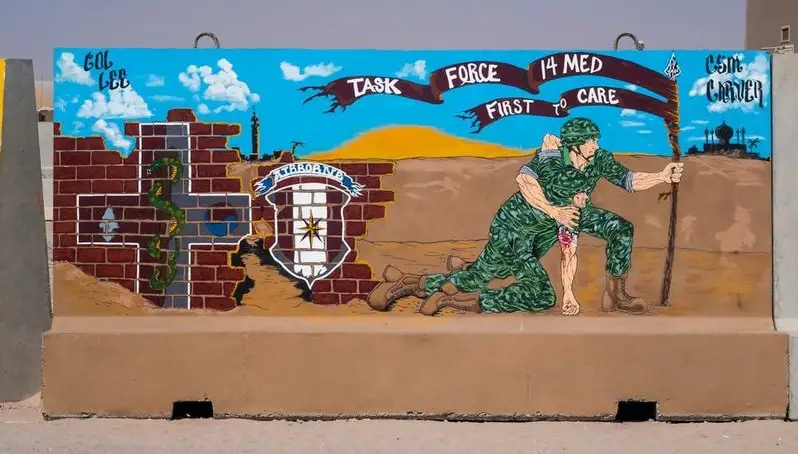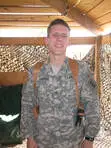
We’ve all heard the stories about how combat veterans are mostly silent about their experiences. Whether it’s your grandfather who never spoke about the war but had a dusty box full of medals and photos. Or that uncle of yours who seemed to go somewhere else whenever Platoon was on the TV. Or maybe it is your spouse who just never was the same when they came home, and they just can’t talk about it.
My own experience coming back from Ramadi as a combat medic was extremely difficult, tougher than I thought it would be. I couldn’t talk to family about it, in fact, at the time the military encouraged us not to talk to family about our experiences. The reasoning was so we wouldn’t worry them with our exploits, solid idea. I remember my wife repeatedly asking me to talk and I only recall thinking to myself what words to describe just one day out of the entire deployment let alone everything that I had witnessed. I didn’t even know where to start. A common theme to our arguments was her statement, “even though you came home, a huge part of you never made it back”.
Though our experiences may not be similar, I only share this to say you are not alone, both veteran and family member. We all have our own outpost, self-created through the walls we put up, no matter your unique experiences, to deal with the unthinkable, the extraordinary, the grief, the guilt, the sadness, the loss. Because of the emotionally charged nature of these experiences, many veterans and current military members don’t know how to share, to explain, to be vulnerable. In fact, vulnerability is what the military trained out of us to keep us alive.
Veterans returning to civilian life struggle with understanding and implementing a certain vulnerability within relationships. What inevitably happens is we shut down, shut out, and build those walls higher around our outpost, to ensure we are safe and that we keep our loved ones safe from the horrors of our experiences. Unfortunately, it often leads to the destruction of the relationships we were so desperate to keep safe.
We end up sticking to the script that kept us alive in combat. We evaluate, we adapt, and do our best to overcome while still not dealing with the underlying issue: processing the trauma. We often feel that our family members simply wouldn’t understand what we’ve been through. Combat experiences are often difficult to explain, and we may feel that our loved ones just don’t have the frame of reference to truly comprehend.
Beyond the perceived lack of understanding, there are more complex emotions deeper within. Many of us struggle with feelings of guilt, shame, or sadness, and we may not know how to articulate these emotions to those we love. Instead, we shove them even deeper inside ourselves, creating more shame, more guilt, and deteriorating our relationships over time. We destroy them through our own attempts at saving them from our experiences.
These are the reasons we created the Graffiti of War Project, the art exhibit, and the book. To help these communities better express themselves through artwork. Whether this is artwork they are looking at with their family or friends or artwork they created. The art becomes the bridge over the chasm of uncomfortable emotions. Military family members, veteran family members, veterans, military members, and the overall population of those who haven’t served make up the five key communities that we created the project for. Each of these communities are separated by a seemingly insurmountable void, lack of understanding, and this project, along with art therapy organizations, can become a bridge over that divide.
Using the art, it sparks conversation as many civilians are curious to understand the artwork and ask questions. These questions promote dialog which feeds understanding, empathy, and connection. We encourage everyone to use this artwork to connect with their veteran or that military member in their family. After nearly a dozen art exhibits over the past decade I can say with authority that this artwork has engaged thousands of conversations between these communities, and it is a beautiful site to take in.
If you are a family member of a combat veteran and you want to broach the subject, it’s important to approach the conversation with sensitivity and respect. Let your loved one know that you’re there to listen if they ever want to talk, but don’t push the issue if they seem uncomfortable or reluctant to discuss it.
In the end, it’s up to each individual veteran to decide whether or not they want to speak to their family members about their combat experiences. For those who choose to keep their memories private, it’s important to honor their decision and support them in any way that you can.
Want more information? I put in some interesting and insightful articles below for further reading. Just need to chat? Email me, I’d be happy to.

Jaeson "Doc" Parsons
doc@graffitiofwar.com
Delivered by FeedBurner





Founder and CEO of The Graffiti of War Project, Doc is a decorated combat veteran of Operation Iraqi Freedom where he was a combat medic with the 54th Engineer Battalion. He is currently the a journalist for Force 12 Media and is featured weekly on SOFREP.com. Docas been featured in numerous media outlets such as Wired.com, Maxim.com and BusinessInsider.com. For more information about Jaeson “Doc” Parsons click HERE or send him an EMAIL.
RSS Feed
April 2023
March 2023
October 2020
June 2019
December 2018
November 2018
November 2016
April 2016
March 2016
February 2016
April 2015
May 2014
April 2013
October 2012
July 2012
December 2011
October 2011
September 2011
August 2011
July 2011
June 2011
May 2011
April 2011
March 2011
February 2011
January 2011
December 2010
November 2010
October 2010
July 2010
May 2010
April 2010
Copyright 2024 – The Graffiti of War Project